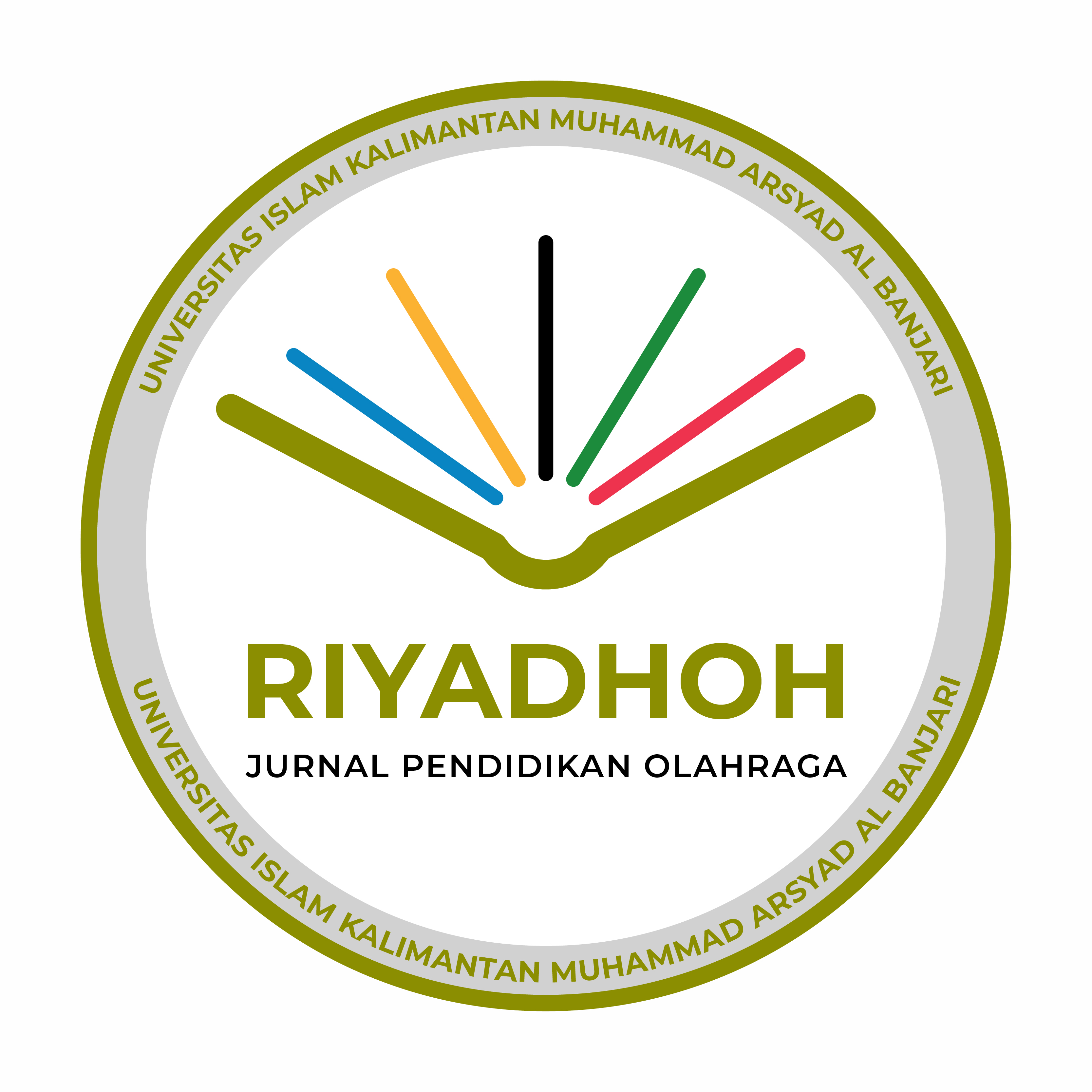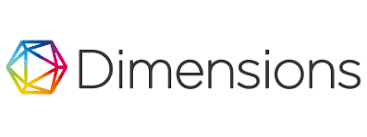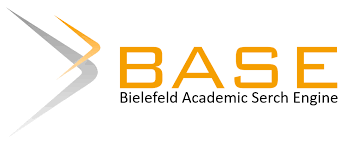- Fokus dan Ruang Lingkup
- Kebijakan Bagian
- Proses Peer Review
- Frekuensi Penerbitan
- Kebijakan Akses Terbuka
- Pengarsipan
- Etika Publikasi
- Sistem Plagiarisme
- Manajemen Referensi
- Pembiayaan
- CC License
Fokus dan Ruang Lingkup
Riyadhoh: Journal of Sports Education has a focused focus on developing the scientific knowledge of the fields contained in sports education
Kebijakan Bagian
Artikel
Proses Peer Review
Every manuscript submitted to Riyadhoh: Journal of Sports Education will be processed immediately for a maximum of 1-3 months. The manuscript will be reviewed by a minimum of 2 reviewers. The peer review process uses a double-blind review method where the reviewers and authors do not know each other. The editor ensures that the identities of the authors and reviewers handling the manuscript remain anonymous.
Each submitted manuscript will be assessed from aspects of substance, technicality, originality, relevance and presentation. Reviewers who collaborate with Riyadhoh: Journal of Sports Education are experts in the field of Sports Education, they are experienced in managing and publishing prestigious journals spread throughout Indonesia.
Frekuensi Penerbitan
Riyadhoh: Journal of Sports Education Published as a scientifically rich publication media from practitioners and academics in the field of sports education to enrich insight, knowledge, theory and practice of Sports Education.
Riyadhoh: Sports Education Journal has a publication frequency of 6 months in 1 year, namely June (Number 1), December (Number 2)
Kebijakan Akses Terbuka
Riyadhoh : Jurnal Pendidikan Olahraga ini menyediakan akses terbuka yang pada prinsipnya membuat riset tersedia secara gratis untuk publik dan akan mensupport pertukaran pengetahuan global terbesar.
Pengarsipan
OJS sistem LOCKSS berfungsi sebagai sistem pengarsipan terdistribusi antar-perpustakaan yang menggunakan sistem ini dengan tujuan membuat arsip permanen (untuk preservasi dan restorasi). Lanjut...
Etika Publikasi
Riyadhoh: Journal of Sports Education focuses on the results of research on scientific development in the field of sports education written by experts, educators, scientists, practitioners and reviewers in the field of sports.
The statement of the code of ethics for scientific publications in Riyadhoh: Journal of Sports Education is based on LIPI Regulation Number 5 of 2014 concerning the Code of Ethics for Scientific Publications, which upholds 3 ethical values in publications, namely: (1) neutrality, clear of conflicts of interest in the publication process; (2) justice, giving the author the right to claim his letters; and (3) Honesty, clear from duplication, fabrication, falsification and plagiarism in publications.
Writer's Duties
Reporting Standards: Authors of original research reports must present an accurate account of the work performed as well as an objective discussion of its significance. The underlying data must be represented accurately on the paper. The paper should contain enough detail and references to allow others to replicate the work. False or intentionally inaccurate statements are unethical and unacceptable behavior.
Data Access and Retention: Authors may be asked to provide raw data in connection with a paper for editorial review. They must be prepared to provide such data within a reasonable time.
- Orisinalitas dan Plagiaris: Authors must ensure that they have written completely original work, and if the author has used the work and/or words of others they have been appropriately cited or quoted.
- Publikasi Multiple, Redundant atau Concurrent:An author should not generally publish manuscripts describing essentially the same research in more than one journal or primary publication. Submitting the same manuscript to more than one journal simultaneously is unethical and unacceptable publishing behavior.
- Source Acknowledgment: Proper recognition of the work of others should always be given. Authors should cite publications that have been influential in determining the nature of the work reported.
Paper Authorship: Authorship should be limited to those who have made significant contributions to the conception, design, implementation, or interpretation of the reported research. All persons who have made significant contributions must be listed as co-authors. If others have participated in certain substantive aspects of the research project, they should be acknowledged or listed as contributors. The corresponding author must ensure that all appropriate co-authors and no inappropriate co-authors are included on the paper, and that all co-authors have seen and approved the final version of the paper and have approved its submission for publication.
Disclosure and Conflicts of Interest: All authors must disclose in their manuscript any financial or other substantive conflicts of interest that could be construed to influence the results or interpretation of their manuscript. All sources of financial support for the project must be disclosed.
Fundamental errors in published work: When an author discovers significant errors or inaccuracies in his or her own published work, it is the author's obligation to immediately notify the journal editor or publisher and work with the editor to retract or correct the paper.
Hazards and Human or Animal Subjects: If the work involves chemicals, procedures or equipment that have unusual hazards inherent in their use, the author should clearly identify these in the manuscript.
Editor's Duties
- Fair Play: An editor at all times evaluates manuscripts for their intellectual content without regard to the race, gender, sexual orientation, religious beliefs, ethnic origin, nationality, or political philosophy of the authors.
- Confidentiality: The editor and any editorial staff may not disclose any information about a submitted manuscript to anyone other than the author, reviewers, potential reviewers, editorial advisors, and other publishers as appropriate.
- Disclosure and Conflicts of Interest: Unpublished material disclosed in a submitted manuscript may not be used in the editor's own research without the written consent of the author.
- Publication Decisions: the editorial board is responsible for determining which articles submitted to the journal should be published. Validation of the work in question and its importance to researchers and readers should always drive such decisions. The editors may be guided by the policies of the journal's editorial board and limited by legal requirements as they apply in the future for defamation, copyright infringement and plagiarism. The editors may talk with other editors and reviewers to make this determination.
- Manuscript Review: The editor must ensure that each manuscript is initially evaluated by the editor for originality. Editors must organize and use peer review fairly and wisely. Editors should explain their peer review process in the information for authors and also indicate which parts of the journal are peer reviewed. Editors should use appropriate peer reviewers for papers considered for publication by selecting people with sufficient expertise and avoiding conflicts of interest.
Reviewer Duties
- Contribution to Editorial Decisions: Peer review helps editors in making editorial decisions and through editorial communication with authors can also help authors in improving the paper.
- Request: Any selected referee who feels unqualified to review the research reported in the manuscript or knows that its brief review will be impossible should notify the editor and be excused from the review process
- Objectivity Standard: Reviews must be conducted objectively. The author's personal criticism is inappropriate. Referees must express their views clearly with supporting arguments.
- Confidentiality: Any manuscript received for review must be treated as a confidential document. They may not be shown or discussed with anyone else except as authorized by the editor.
- Disclosure and Conflicts of Interest: Privileged information or ideas obtained through peer review must be kept confidential and not used for personal gain. Reviewers should not consider manuscripts in which they have a conflict of interest resulting from any competitive, collaborative, or other association, association, or relationship with any author, company, or institution associated with the newspaper.
- Acknowledgments of Sources: Reviewers should identify relevant published work that has not been cited by the author. Any statement that an observation, derivation, or argument has been previously reported should be accompanied by relevant citations. A reviewer should also call the editor's attention to substantial similarities or overlap between the manuscript under consideration and other published papers of which he or she has personal knowledge.
Sistem Plagiarisme
Manuscripts submitted to Riyadhoh: Journal of Sports Education will be checked for authenticity of each manuscript's contents through a plagiarism process using Small SEO Tools
Sanctions, every manuscript submitted to Riyadhoh: Journal of Sports Education is then proven to be plagiarized, so the journal management takes the following stance:
WARNING
- Warning letter
- Article retraction
- Cancellation of publication
Manajemen Referensi
Manuscripts included in Riyadhoh: Journal of Sports Education are advised to use reference applications such as Mendeley
Pembiayaan
Publication Fees
Article Submission: 0.00 (IDR)
Article submission fees are free.
Article Publication: 400,000 (IDR)
Publication fees that must be paid by the author, if the article has been declared accepted and will be published in the volume and issue number determined by the journal editor.
CC License
Riyadhoh : Jurnal Pendidikan Olahraga disebar luaskan oleh : Lisensi Creative Commons Atribusi 4.0 Internasional.











.jpg)






